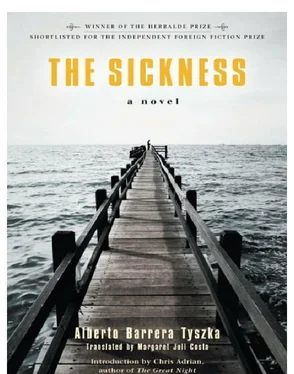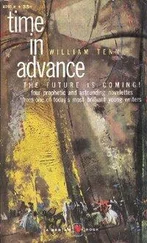“Dad has cancer,” Andrés says.
Those words, hard and all of a piece, fall onto the bed. They lie down between them. Mariana is surprised, taken aback. She doesn’t know how to react.
“It’s lung cancer.”
“But. .”
“There’s nothing to be done,” adds Andrés, making a great effort. Each word weighs on him, hurts him, tastes of glass.
“That’s not possible. We have to do something,” she says, shaken, moving her naked body closer to his.
“We can do all the usual things — chemo, radiotherapy. But it’s stage IV. It’s spread. He has metastasis to the brain.”
“Oh God!” is all Mariana manages to say, like an exhalation, before covering her face with her hands and breaking into sobs.
Andrés puts his arms around her. He, too, would have preferred to use a different term, less definitive, less final. Suddenly, that stumbling of one t against another, that precipice of s ’s in the word metastasis leaves them clinging to each other, unable to speak, simply crying.
Tears are very unliterary: they have no form.
“Are you going to tell him?”
“I don’t know.”
Mariana pulls on her dressing gown and goes into the kitchen to get a glass of water. Andrés still isn’t hungry. He rolls over so that he’s lying on his back, still naked, gazing up at the ceiling. This was almost a sport for him when he was an adolescent and used to spend hours staring at the ceiling. He can even remember the different lamps he had in the different bedrooms of the many apartments he lived in with his father. His father liked moving. That, over time, is the only explanation he has found. Every two years, Javier Miranda would be seized by a strange restlessness, by an uncontrollable enthusiasm for new property. He would search the classified ads for a new place to live, another apartment to rent. He did this with such intense interest that Andrés came to feel that each move was a journey to another country, a marvelous excursion. Instead of taking vacations, they moved apartments.
After the accident, his father never again boarded a plane. Never. Andrés remembers this now. He also remembers that he himself had to overcome the same fear. He was always looking for an excuse not to travel, until his wedding and the honeymoon, which Mariana was reluctant to spend on the Venezuelan plains. Thanks to an uncle who owned a travel agency, she had been offered a bargain break in the Dominican Republic. Before Andrés even had a chance to confess his fears, she had the air tickets in her hand. On the outward journey, he took 6 milligrams of bromazepam, and on the homeward flight, he drank a whole bottle of rum. He spent the four days in between shaking. Each time he remembered that he would have to get on a plane again, he was gripped by terrible anxiety. The Dominican Republic was an exception, and had it not been for therapy, it would have remained the one exception of his life. He would never have gone on any vacations abroad, he would never have attended any medical conferences held outside Venezuela. He would only have known places one could reach by car. That was his father. That was Javier Miranda now. Almost seventy years old and with lung cancer.
Andrés lies there naked and staring up at the ceiling: when he was an adolescent, he associated that position with having a good wank, with the ritual of masturbation. Age has its advantages. Masturbation is a generous, irreplaceable act that develops self-esteem and promotes good health; nevertheless, it can’t compare with the satisfaction of having sex with a partner. The best orgasms are always to be had with someone else. It was only when he met Mariana, and they both became experts in the art, one with the other, that Andrés began to experience really profound orgasms, real festivals of tremors and tremblings, of indescribable chemical discharges. Sometimes, when he ejaculated, the feeling was so strong that he felt that blood not semen was being expelled from his penis. Physical ecstasy is inevitably and marvelously bound up with dirt and the idea of dirtiness. Baudelaire believed this was a condition of love. “We are,” he wrote, “reduced to making love with the excremental organs.”
Mariana is back. She’s carrying a glass of water and looking thoughtful. All this time, she has been pondering the same question, which she can’t shake off: “Are you going to tell him?”
In the early hours, the same question haunts Andrés. It buzzes like a mosquito in his ear, alights on his left cheek, almost dances on one eyelid. He’s done everything he can to shoo it away, but it’s very insistent. He goes to his shelves and searches out a book by the Mexican doctor Arnoldo Kraus, A Reading of Life , in which he recalls coming across an analysis of the conflict between those who think that “telling the patient everything can be counterproductive” and those who think “it’s unethical to withhold information.” He skims the pages while Mariana, still naked, sleeps beside him. He knows he’s not going to find any magic recipe or instruction or order. Or even advice. Dying should always be a simple act: there’s nothing simpler than a massive heart attack. The difficulty lies in what is not yet over, in sickness. It’s the experience of loss brought to a climax, to a threshold from which there’s no return. Is it really necessary for his father to know the truth? What advantage would that bring him? What can he do with that information? What use is it for him to know that his body is betraying him, that very soon he will die?
Andrés can analyze the effect of this news on himself. Since he saw the scan of his father’s brain until now, until this rumpled dawn moment, how has he felt? Tense, nervous. He’s filled with a sense of haste, of hurry and anxiety. It’s an inner despair, almost liquid, that never ceases to boil, to flow, to stain everything. His memory is permanently startled. Memories, images, anecdotes come and go all the time. It’s as if the past had been let out of a box. He is now pure, stampeding fear. Would it be the same for his father? Would all the memories of his nearly seventy years rush into his mind? Would that be the best way to say goodbye to life?
Andrés reads an extract from Kraus’s book: “In fact, it isn’t at all easy to tell which patients will be capable of being told everything and which will not. It’s a complicated business determining who will benefit from knowing how long it will be before they go blind, before they cease being able to walk or require catheters to ensure that their sphincters continue to function. And yet it’s clear that there are some people capable of handling bad news and others who simply can’t.” Which group does Javier Miranda, his father, belong to? Was it possible to place him, with exactitude, among those who know how to handle “bad news”? A piece of fateful, not to say final news? Perhaps Miguel was right: it’s not possible to guess how one human being will react when he discovers how close he is to death. That strong, determined man called Javier Miranda might, despite all predictions to the contrary, collapse and break down when faced with that scan of his brain and the glowing spots devouring it.
Dear Dr. Miranda,
I have a confession to make: I’m following you.
Up until then, up until she read those words, Karina has thought of Ernesto Durán as a mere curiosity. She has read his previous e-mails with a smile on her face. Dr. Miranda’s secretary is in charge of anything that arrives in his electronic inbox. It’s intended exclusively for professional correspondence. He tends to get a lot of promotional material from medical laboratories and pharmaceutical companies, as well as invitations to work-related activities — meetings, official functions, book launches, conferences. . Somehow or other, though, Ernesto Durán has managed to get hold of that address and has started sending messages. When the first e-mail arrived, Karina immediately reported it to Dr. Miranda. He read it and told her to ignore it and on no account to reply. She didn’t even tell him about the second one, but although she said nothing to the doctor, she made a point of reading it herself. After that first e-mail, Karina, along with Adelaida, the receptionist working for the doctor next door, exchanged views on this very unusual patient. They had never come across anyone quite like Ernesto Durán. When the second e-mail arrived, they spent many hours discussing the case. Karina, who had seen Durán on two occasions, added a few physical details. She remembered him quite clearly as a thin, athletic-looking man. He was about thirty-five, with hair as dark as his eyes: asphalt black. He was attractive, but nothing special. He also had an inner strength, or so Karina felt, a sort of natural willpower that gave him a certain physical presence. Perhaps the only objectionable thing about him was his ears, which were, in Karina’s view, too small. And Adelaida had added some comment like:
Читать дальше












